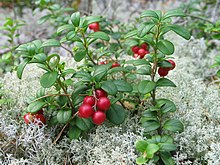Lingonberries
| Lingonberry | |
|---|---|
 |
|
| Vaccinium vitis-idaea var. vitis-idaea in reindeer lichen | |
| Scientific classification | |
| Kingdom: | Plantae |
| (unranked): | Angiosperms |
| (unranked): | Eudicots |
| (unranked): | Asterids |
| Order: | Ericales |
| Family: | Ericaceae |
| Genus: | Vaccinium |
| Species: | V. vitis-idaea |
| Binomial name | |
|
Vaccinium vitis-idaea L. 1753 |
|
| Synonyms | |
|
Synonymy
|
|
Vaccinium vitis-idaea (lingonberry, partridgeberry, or cowberry) is a short evergreen shrub in the heath family that bears edible fruit, native to boreal forest and Arctic tundra throughout the Northern Hemisphere from Eurasia to North America. Lingonberries are picked in the wild and used to accompany a variety of dishes in Northern Baltoscandia. Commercial cultivation is undertaken in the U.S. Pacific Northwest.
Vaccinium vitis-idaea is most commonly known in English as lingonberry or cowberry. The name lingonberry originates from the Swedish name lingon for the species, and is derived from the Norse lyngr, or heather.
The genus name Vaccinium is a classical Latin name for a plant, possibly the bilberry or hyacinth, and may be derived from the Latin bacca, berry. The specific name is derived from Latin vitis ("vine") and idaea, the feminine form of idaeus (literally "from Mount Ida", used in reference to raspberries Rubus idaeus).
There are at least 25 other common English names of Vaccinium vitis-idaea worldwide, including:
Vaccinium vitis-idaea spreads by underground stems to form dense clonal colonies. Slender and brittle roots grow from the underground stems. The stems are rounded in cross-section and grow from 10 to 40 cm (4 to 16 in) in height. Leaves grow alternately and are oval, 5–30 mm (0.2–1.2 in) long, with a slightly wavy margin, and sometimes with a notched tip.
The flowers are bell-shaped, white to pale pink, 3–8 mm (0.1–0.3 in) long, and produced in the early summer.
The fruit is a red berry 6–10 mm (0.2–0.4 in) across, with an acidic taste, ripening in late summer to autumn.
...
Wikipedia

